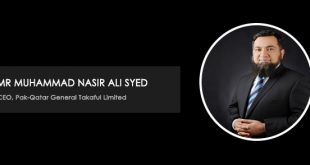When last year at the eve of World Islamic Economic Forum, British Prime Minister David Cameron announced a plan to issue $323 million sovereign sukuk, or Islamic bond, to attract new money to London, then his announcement not come out as a surprise for in and outside Muslim countries. No doubt, Islamic finance is naturally more popular among Muslims because of their religious beliefs, with Malaysia leading the rest of the Muslim world. But its acceptance has also grown fast in the West in recent years as it offers an “ethically acceptable” alternative to conventional banking, besides affording an opportunity to governments and businesses to attract money from Muslim countries.
In this circumstances, Britain’s government sought to bolster London’s position as a hub for Islamic finance, and after becoming the first Western state to launch an Islamic bond, Britain extending its “Help to Buy” mortgage scheme to loans that comply with Islamic law. Help to Buy was launched last year and offers banks insurance against the risk of lending to home-buyers who cannot afford large mortgage deposits. According to Finance Ministry, property finance plans that circumvent Islam’s bar on interest payments would now be eligible in the same way as standard mortgages. At present Islamic finance is worth around 11 billion pounds ($18 billion) a year to Britain.
Along this, Islamic finance boosts Islamic banking in France and US too. For this, a memorandum of understanding has been signed between al Huda Centre of Islamic Banking and Economics and Franco American Alliance for Islamic Finance last year to boost Islamic banking and finance in France and the United States. The European central bank and the Malaysia-based Islamic Financial Services Board worked last year on a joint study on policies affecting Islamic finance in Europe. Munich based FWU Group, which offers Islamic insurance solutions, has also issued Islamic bonds since 2012 December.
Seeing the huge potential for Islamic Banking in West, private investors from Gulf Arab countries, including a royal family from the United Arab Emirates, plan to establish the first full-fledge Islamic bank headquartered in the eurozone, Luxembourg during the last quarter of 2014. With initial capital of 60 million euros ($80 million), the bank would offer retail, corporate and private banking services, and in future would open branches in Paris, Brussels, the Netherlands and Frankfurt.
With growing potential of Islamic finance in West instigate the query that why Islamic finance emerge as a potential market in West. Especially in a condition when we see that Islamic world has a combined GDP of $6.6 trillion, which is only 8 percent of the world GDP. Yet Islamic world exports are only 14 percent of the global exports. Average GDP per capita in 57 Islamic countries is $4,900, which is slightly less than half of the global average of $10,400. Despite all these facts, there are some healthy sign for its growth:
- As in the Muslim world, conventional and Islamic banking work together, so in the Western world, a financial industry built on Shariah compliance doesn’t threaten or seek to undermine conventional financial structures.
- The primary focus of Shariah is the promotion of social justice. And Shariah- compliant investments are a subset of a larger trend: socially responsible investing (SRI). SRI is a broad term that refers to making investment choices in support of companies whose activities mesh with your values. More important socially responsible investors look for fund managers to do exactly what Islamic fund managers already do.
- The modern Islamic financial industry has grown up and out to encompass new products, involve new markets and attract many new customers. As in 2012, Islamic finance assets stood at $1.6 trillion at the end of 2012 and are projected to soar to $6.5 trillion by the end of 2020. As many as 375 banks and financial institutions practice dedicated Islamic finance while another 110 conventional banks and financial institutions have opened windows to meet the needs of customers. The globally traded sukuk market has shot up to $0.5 trillion in the last seven years. Substantial growth will continue for many years to come.
- Since the global financial crisis, some European governments have shown more interests in Islamic finance, partly because it could be a way to attract cash-rich funds from the Gulf and south-east Asia. As they know that wealth concentrated in the countries of the Gulf Cooperation Council, Bahrain, Kuwait, Oman, Qatar, Saudi Arabia and United Arab Emirates.
- The Islamic world comprises a population of more than 1.5 billion people, which is 23 percent of the world population. If a reasonable number of people seek out Shariah-compliance products, the Islamic financial industry will soon be in high demand.
- It is estimated that an increase of Muslims in European population expected from 6% in 2010 to 8% in 2030. Muslim population statistics represent real people who are a captive market of the Islamic finance industry people with religious beliefs that drive them toward Shariah-compliant products. Muslims resident in West also need financial products that offer the same types of rewards everyone seeks (such as security for their savings and rewards for their investment) without compromising their moral code.
- Investors also looking to reduce risk while still earning a profit, Islamic investment products are very different from conventional equity and bond funds. As it is based on business contracts that increase transparency and reduce speculation so that all contract partners know what to expect and what risks are involved. In addition, screening equities for Shariah-compliance includes looking closely at companies financial ratios to eliminate those that, say, carry too much debt.
- The end result of such diligence on the part of Islamic fund developers is that Shariah-complaint investment products often involve less risk than their conventional counterparts.
- In this globalized world where, companies of all sizes can easily seek customers across the globe and doing so has become a matter of survival. Western financial firms certainly recognized the need to tap into global markets of Islamic finance and technology makes it simple to transfer assets quickly among institutions thousands of miles apart. As present day all financial institutions tried to meet the needs of customers, many of those customers will be Muslims seeking Shariah-compliant products.
Opening of the Islamic banks in Western countries not only a great way to set foot in their markets but also source to open the floodgates to an investment hub in the West.
 PAGE Blog Business Weekly Magazine
PAGE Blog Business Weekly Magazine

